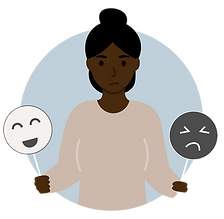Is this
menopause?

Irregular
periods

Sensitivity to
cold

Weight
gain

Vaginal
dryness

Night
sweats

Mood
swings

Hot
flashes

Sleep
disturbances

Hair loss &
dry skin

Tender
breasts

Frequent
Headaches

Brain
fog
It's the hormones.
Hormones change throughout our lives.
They have a significant impact on our organs, on triggering the monthly cycle, and on our overall well-being. Before perimenopause, hormone release is regular, providing us with a steady supply. In perimenopause, however, hormone levels start to fluctuate irregularly, and during menopause, they drop significantly. We particularly notice this in areas of the body where hormones have a strong influence.
PREMENOPAUSE
PERIMENOPAUSE
POSTMENOPAUSE

Estrogen
Progesterone
Follicle Stimulating Hormone
Luteinizing Hormones
This is what the hormones
in your body do!

10 Facts about your menopause.

1. We carry all our eggs within us from birth.
2. Over time, eggs are lost, for example, during ovulation.
3. The number of eggs determines our supply of estrogen and progesterone—our female hormones—and also the onset of menopause.
4. Once the eggs are depleted, our hormone supply diminishes, and our hormone levels decline.
5. This leads to symptoms in 75% of women.
6. These symptoms often begin as early as the mid-40s.
7. The first hormone we start to lack is progesterone.
8. Hot flashes usually come later, once estrogen levels drop.
9. Urinary incontinence issues also often worsen as hormone levels decrease.
10. Contraception should still be considered as long as periods are occurring.
What does treatment
with us involve?
As gynecologists, we take a holistic approach to your care. We systematically assess your symptoms and carefully plan the therapy. Any secondary conditions are also considered. We measure hormone levels and take time to understand your lifestyle. If we jointly decide on hormone replacement therapy, we use low-risk, bioidentical treatments. We conduct regular examinations to monitor for any side effects of the hormone replacement therapy.
Analysis of your
hormone levels
Advice on nutrition during menopause
Conducting a thorough examination
Counseling on exercise during menopause
Therapy options with and without hormones
Determining general blood parameters
Choose your appointment.
We are available for you at our practice in Berlin or online.
At the practice, we can check your blood parameters and perform an ultrasound of your breasts and uterus. Additionally, we can discuss whether a bone examination or other tests would be beneficial.
We are also happy to offer Online Consultations.
Feel free to email us to schedule an appointment at the practice via
> Team@Deinefab.de
Pls note: We take ample time for you and conduct comprehensive preventive examinations, which are mainly not covered by statutory health insurance.
These services are therefore mostly billed according to the German Medical Fee Schedule (GOÄ). Private insurance companies typically cover the costs of these treatments, while statutory health insurers often only cover them partially.
Feel free to contact us if you have any questions!

Meet your team of doctors.
We are your experts in menopause and women's health.
What our patients say about us.
I feel much better now
I had very severe menopause symptoms and couldn't sleep for months. I had a thorough examination at the practice, and we started hormone replacement therapy. Over time, we made some adjustments, and now I feel great. I have more energy and a much better mood. Thank you for the excellent advice and reliable care.
Super quick and easy
I don’t live in Berlin, and it’s very difficult to find a good gynecologist in my area. The online consultation has been a great help to me. I now visit the practice once a year and otherwise connect online for quick feedback and a new prescription.
Thank you!
I believe these are the nicest doctors I know. A huge thank you for the wonderful journey through my menopause.
Frequently asked questions.
-
Can also young women use an IUD?Yes, the IUD can also be used by young women.
-
Is pain to be expected during the insertion?We perform the insertion as gentle as possible under ultrasound control. However, the sensation of pain varies from woman to woman. Some women report a period-like pain, others only notice a slight pulling sensation, which can last for a few days.
-
How long does an insertion take?An insert usually doesn't take too long, but it depends on what anatomical conditions the doctor finds. You can assume that it will take 5-10 minutes.
-
Do I have to have my period to use an insert?In principle, we can insert the IUD at any time, but this has to be discussed individually.
-
Can I have an IUD inserted if I have had unprotected sex?Yes, in such a case you can have the IUD inserted afterwards, as “morning-after pill (IUD)”. The IUD prevents the implantation of a fertilized egg until the fifth day (= 120 hours after unprotected sex) and is the safest method of emergency contraception with an effectiveness of >99%. The copper chain, the copper ball, the copper IUD can be inserted for this purpose.
-
Can I get pregnant while I am using an IUD?Pregnancies while using an IUD are extremely rare, but they can occur. With a copper IUD the frequency is 30 per 1000, with a hormonal IUD the frequency is 3 per 1000, which means that around 3 women out of 1000 women become unintentionally pregnant. For comparison: when using a condom the fequency is180 per 1000 and without any contraception it is 850 per 1000.
-
Is pain common after inserting an intrauterine contraceptive?No, it really depends on the size of your uterus and on choosing the right intrauterine contraception for you. Women describe sensations like little period pain from time to time.
-
What costs should I expect?There are costs for intrauterine contraception, the preliminary consultation and the insert.


Contact & Opening hours

Frauenmedizin
am Bundesplatz
Bundesplatz 3
10715 Berlin
030 8573190
Team@Deinefab.de
MON - THU 8:30 a.m. - 7 p.m.
FRI 8:30 a.m. - 2 p.m.
If you have any questions, please write us an email at Team@deinefab.de







